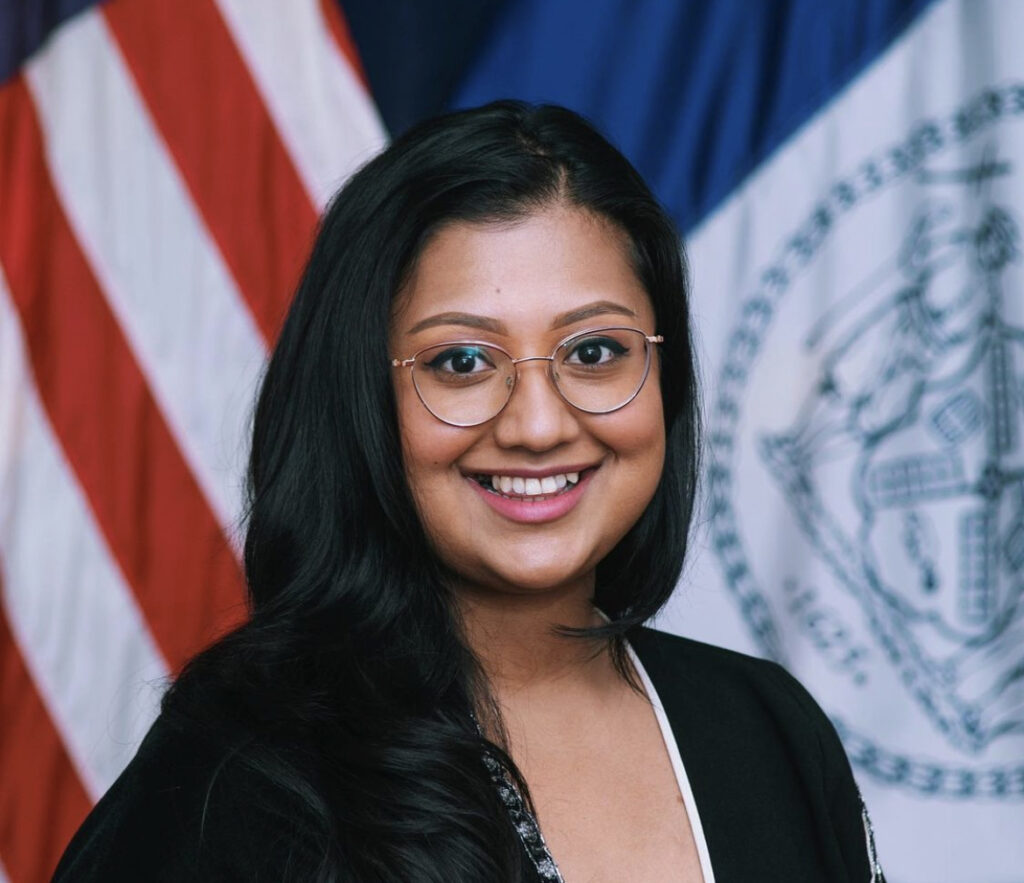A persistence borne since childhood leads to success in public service

By Islamic Horizons Staff
November/December
New York City council member Shahana Hanif, who represents Brooklyn’s 39th ward, remembers that growing up in the city after 9/11 was not easy. She became very protective of her Kensington community at the tender age of 10, for even then date she could recognize how Islamophobia was harming her fellow New Yorkers and making them feel unwelcome.
Hanif, the first Muslima elected to the council and the first woman to represent her district, recalls how she responded by bringing together neighborhood youth in her age group to write a letter to then-President George W. Bush calling on him to end anti-Muslim racism.
She remarks, “We never heard from him, but continued to deepen our commitment to safety in our community.”
Hanif, who is chair of the Council’s Immigration Committee, was born and raised in Kensington, Brooklyn, the daughter of two Bangladeshi Muslim immigrants.
She adds, “What was most unsettling was the New York Police Department’s (NYPD) surveillance program that found its way into my life. When I was at Brooklyn College, news broke that the NYPD had planted informants among Muslim college students to report on us. These were my friends. We were just teenagers going about our lives, and we were being treated like potential terrorists. My privacy had been invaded, but I also felt deeply betrayed by my city. That layers and layers of city government and bureaucracy had allowed innocent people to be spied on, harassed and entrapped, all based on some racist witch hunt.”
As a council member, Hanif says it’s her responsibility to hold this city, and especially the NYPD, accountable for the pain they caused to law-abiding citizens at every opportunity. Just this year, she pushed the NYPD to publicly acknowledge its illegal surveillance program. She adds, “the now former Deputy Commissioner of Intelligence and Counterterrorism John Miller had the audacity to lie to my face, under oath, claiming such a program never existed. But we fought back, demanding accountability and eventually pushed Miller into an early retirement.”
The city, she says, still has a lot of healing to do from this dark chapter; however, she is “hopeful [that] we can acknowledge this pain and begin that process.”
A graduate of public school 230 and Brooklyn College, before being elected to office Hanif directed Organizing and Community Engagement for then-council member and now comptroller Brad Lander. During those years, she led grassroots initiatives like Participatory Budgeting.
Asked if her Bangladeshi background has helped her in her successful career, she said, “Starting from when I was young, I have always felt the tight bonds of the Bangladeshi community here in Kensington. I have vivid memories of running around my father’s restaurant and seeing aunties and uncles from all over the community working, eating and building community. They are more than just my neighbors; they are my extended family.
“Being Bangladeshi here in Brooklyn means living the values of a people who were revolutionaries to demand language justice and preserve Bangla. It is because of my parents and this massive network of Bangladeshi people that I can speak, read and write in the Bangla language. Being able to communicate in Bangla has made me a stronger advocate and organizer for our community.
“This community continues to do everything to support me, including when I ran for City Council. We were lucky to have support from all over the district, but no one turned out like Kensington. Not only did the Bangladeshi community turn out in historic numbers to vote for me, but they were also some of our strongest volunteers.
“When I started my campaign, I was counting on my extended Kensington family to be the backbone of our campaign, and they were there every step of the way. From Bangladeshi Americans for Political Progress (BAPP) to the Bangladeshi Ladies Club, my community was the cornerstone of my campaign. They knocked on doors, talked to their friends and family and made sure that when election day came around, we were electing the first Bangladeshi American to the City Council.”
About facing discrimination by other South Asian communities for being of Bangladeshi origin, Hanif says, “I have, and being honest, it’s not something that’s easy to talk about. Especially having faced discrimination post 9/11, I’ve always tried to maintain a strong sense of solidarity with Muslims and people of color. I know our strength comes from our unified opposition to white supremacy, but I also know that ‘colorism’ is just another form of white supremacy in action.
“When South Asians create hierarchies of status with other South Asians or people of color, we reinforce the racist systems that keep white supremacy at the top of the power structure not just in America, but also in the world.
“Colorism is just a byproduct of colonialism, one used to serve the old colonial powers in their quest to subjugate our people. When this happens to me, it’s hard because I’m hurt. But I also want to build solidarity. It can be difficult to set aside those personal feelings in service of something more, but I try my best.
“In the larger context of South Asian organizing in the diaspora, Bangladeshi struggles and our history often get excluded or erased. In my work, I am explicit about my Bangladeshi identity and the working-class enclaves that continue to build up our City — Bangladeshis are a visible community and I don’t want the work we are doing as taxi drivers, delivery workers at Dunkin’ Donuts and in other low-wage workplaces to be forgotten.”
Tell us what you thought by joining our Facebook community. You can also send comments and story pitches to [email protected]. Islamic Horizons does not publish unsolicited material.
